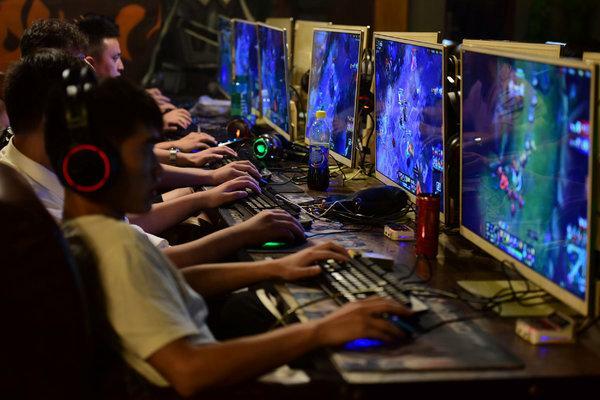The argument for gambling video video games with our children
CNN)There is, inevitably, a gap between the mother and father we are and the dad and mom we assume we’re. Not like algorithms, we depend on the past to inform our parenting selections in the gift. But this global keeps on turning, and the parenting present is by no means pretty like the beyond.
In his new book, “The New Childhood: Raising Kids to Thrive in a Connected World,” Jordan Shapiro considers how this gap is playing out in our youngsters’ display screen time. Many dad and mom see themselves as dutiful and, at the least, every now and then wise, courses for his or her children. We help them make appropriate decisions at college, with friends, and in the sports discipline. But on digital lives, many kids tend to be steering the delivery on their very own.
I am, without query, guilty. I’m a worried and considerate parent … Besides, when my 6-year-old son performs video games. As long because the games appear to be age-appropriate, I permit him to play something he pleases while I thankfully do something else for a couple of hours every weekend. Quality time and its attendant bonding and life training take place later.
But after speaking with Shapiro and analyzing his ebook, I noticed how that is a mistake. The extra each person’s lives take region on virtual commons, he explains that we want to spend a great time with our children online, showing them around the area and how matters work. “We recognize abstinence intercourse education doesn’t work and creates unhealthy sexual relationships. So why are we taking a comparable method with display time?” Shapiro said. Instead of shying far from the virtual bogeyman, he wants his mother and father to embrace it.
“Why don’t we construct rituals with new technology that educate [our children] ethical and moral classes?”
Screen time can be a satisfactory time.
I went all in. Every night for every week, at some point of our fine time slot, we played “Minecraft” together — his preferred virtual entertainment. I entered this arrangement totally and willfully ignorant about this immensely famous game. My first discovery become that my son, no matter having already performed for a couple of months, knew little more than I did. “What have you been doing when you performed?” I asked as gently as feasible after he could not reply to a series of basic questions about the sport. “Just transferring around and killing creepers,” he spoke back.
“Minecraft” is a sandbox sport, the sort in which a participant is loose to roam a digital global instead of progressing from degree to stage. Sure, there are lots of moving around and killing horrific guys. However, it is some distance from the entire factor. The larger purpose is survival, and advent and destruction are each keys to that survival.
He adroitly knocked off a few creepers on our first night time and then got stuck in a mine. We attempted knocking via the wall, knocking, and knocking, until the idea of being trapped on this mine for all time beat us and, collectively, we decided to name it.
“Next time, let’s do innovative mode,” my son said. There are more possibilities to figure things out in this mode and, as I apprehend it, no danger, one may say, get chased by means of a creeper right into a darkish pit and wither for eternity. This led me to my 2nd discovery, that’s that my son was extra interested in mastering how matters work than accomplishing any precise goal.
Over the next few nights, we slowly explored. We figured out which buttons do what and how to make use of the diverse materials we picked up in this virtual wasteland. When he killed something, be it a awful guy or an animal, I’d ask him why. His solutions discovered that this wasn’t about aggression; however, expertise, reason, and effect. “See, you get stuff,” he stated after killing a cow and receiving a small pixelated steak. Toward the top of the week, I asked him whether he wanted to exit of innovative mode and returned to the more hard survival mode. “No, I actually have plenty to study,” he spoke back.
We spent the relaxation of the time operating together, participating in thoughts for method and hassle-fixing. There were moments after I stuck myself looking at my smartphone, desperate to be immersed in a digital world of my own deciding on. But there have been additionally moments of mutual pleasure, each in times of triumph in addition to instances of goofball failure. Unlike the physical international, “Minecraft” is similarly foreign to each people. We were both the guide and the guided.

What occurs while we play
As Shapiro makes clear, there’s loads of vital parenting stuff taking place right here.
Video games, which regularly involve warfare and sacrifice in the name of survival, gave me a threat to invite my son moral questions like “why are you killing that cow?” Even if he could not constantly answer those questions, his attempts to reply to them marked the first step in his expertise of why such questions benefit answering.
Also, while we generally tend to associate video games with less-proper traits like addiction and impulse, succeeding at them requires a number of essential existence skills, too. One has to exhibit self-law, focus, and a willingness to analyze and then play through the policies. In a great world, those are standards everybody holds close before maturity.
“The more they play, the better they get at mediating the anxiety between their own playful goals and the boundaries that create a area for amusing,” Shapiro writes in “The New Childhood.” Lastly, video video games train us in a way to collaborate. I am the primary in what will possibly be an extended line of other humans with whom my son will play video video games. (“Minecraft,” for instance, allows users to truly play along with other people in actual time.) In his e-book, Shapiro points to research showing how online multiplayer games can lead to lasting friendships and a experience of network and teach players about the price of collaboration.
Of path, I can be coaching my son all the above in what Luddites call “the real world,” but Shapiro says it is now not the same. Coaching our children through the norms of the digital world allows them to be powerful communicators and savvy clients of information — online. Whether it’s far video games, YouTube, social media, or whatever comes next, kids need us to put together them for what will probably be a relatively digitized future.
Even at the younger age of 6, my son changed into already making selections about his digital life on his personal, via his choice of video games. He may want to have determined his way to a way less notion-scary — and ways extra indecent — video games than “Minecraft.” “It is an economic and civic necessity to help children online,” Shapiro stated, expressing his desire that the subsequent generation may be taught virtual skills like how to spot the difference between actual information and pretend information. “We train them manners for playground life, and we should be coaching their manners for an online existence, too.”
Do I see a long future of mom-son online game nights beforehand? Not genuinely. I may want to fast list as a minimum of two dozen activities we do collectively than I enjoy extra. But no more sending him out into the digital abyss on his personal anymore, both. I’ll preserve gambling for the practical benefits and the emotional ones, too. Taking part in some other’s pleasure, no matter how anodyne or indecipherable that pride may feel to us, is revelatory. We analyze what makes them tick, and we study what makes them smile. They, in go back, experience understood. This is worth at least a weekly video game consultation — two times a week, tops.
















